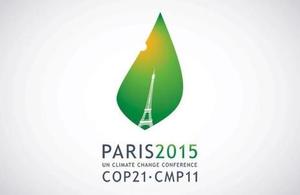COP21 explainer
This December officials from 195 countries across the world will gather in Paris, France, to try to agree a deal to tackle global warming.

What do we know about climate change, and why it is important to reach an agreement?
What is Climate Change?
The planet’s climate has constantly been changing over time. However, there is clear evidence to show the current period of warming is occurring more rapidly than many past events. Measurements show that the average temperature at the Earth’s surface has risen by about 0.8°C over the last century, and 13 of the 14 warmest years on record have occurred in the 21st century. Scientists have found that this warming is primarily due to an increase in greenhouses gases as a result of the impact of human activities, including;
- burning of fossil fuels for energy
- agriculture and deforestation
- the manufacture of cement, chemicals and metals
Rising levels of carbon dioxide and other gases, such as methane, in the atmosphere create a ‘greenhouse effect’, trapping the Sun’s energy and causing the Earth, and in particular the oceans, to warm.
What are the effects of Climate Change?
Global warming will have a number of affects on our planet, including;
- warming oceans
- melting polar ice and glaciers
- higher sea levels – with larger storm waves putting a strain on coastal defences
- more extreme weather events
- heavier rainfall events – with increased risk of flooding
- more and longer-lasting heat waves
Rises in global temperature will have both direct and indirect effects on Countries across the world, including UK and Russia. For example food supplies could be affected as crops both domestically and overseas could be damaged by changes in temperature, rainfall and extreme weather events. These affects could also have negative impacts on health, poverty, and migration. We can already see the impacts of climate change happening and these will become more severe as global temperatures rise. How great the impacts will become depends upon our success in reducing greenhouse gas emissions.
What is COP21?
COP21 is short for the 21st Conference of the Parties to the United Nations Framework Convention on Climate Change. The UN Framework Convention on Climate Change (UNFCCC) was signed at the Rio Earth Summit in 1992. Every year since 1992 the Conference of the Parties (COP) has taken place with negotiators trying to put together a practical plan of action to address climate change. 195 countries have now signed the convention including US, China, Russia, and the UK.
4 years ago it was agreed that all countries would reach a deal agreeing how to deal with the issue of climate change by the end of 2015. This December countries will meet in Paris to achieve this aim. Around 40,000 people from all over the world are participating in two weeks of negotiations, including 151 World Leaders – making COP21 the biggest ever gathering of world leaders under one roof on a single day.
The purpose of the Paris COP is to work out a way of limiting emissions of greenhouse gases to 2˚C, a level that will prevent dangerous climate change, while allowing countries to continue to grow their economies, and providing assistance to the least developed and those most affected by rising temperatures. This will include pledges and targets from Nations to decrease their greenhouse gas emissions by 2030.
If we take action to radically reduce greenhouse gas emissions now, there’s a good chance that we can limit average global temperature rises to 2˚C. This doesn’t mean that there will be no more changes in the climate – warming is already happening – but we could limit, adapt to and manage these changes.